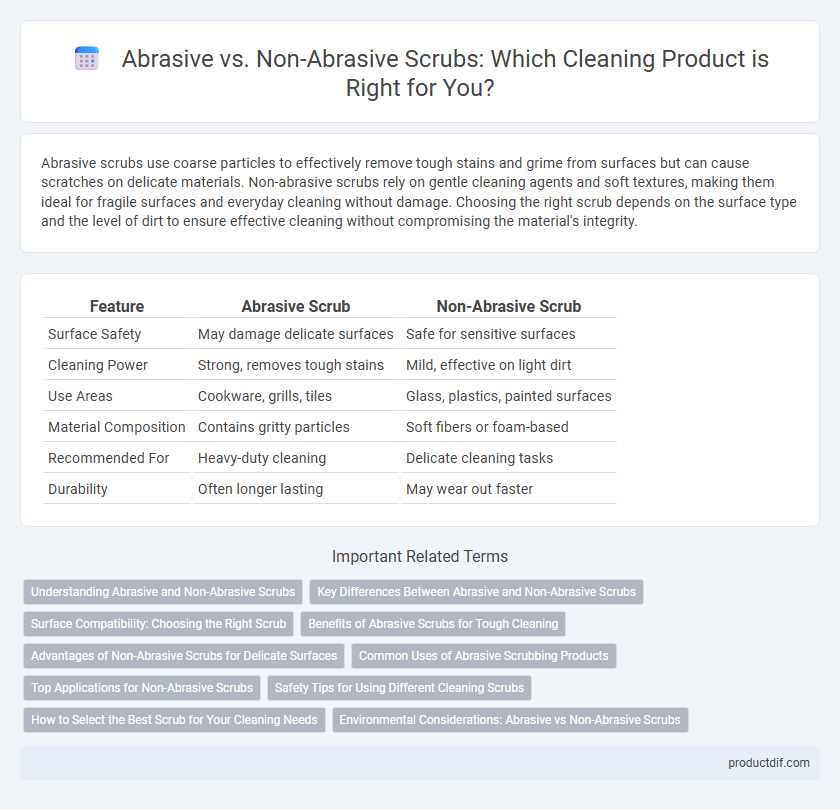Abrasive scrubs use coarse particles to effectively remove tough stains and grime from surfaces but can cause scratches on delicate materials. Non-abrasive scrubs rely on gentle cleaning agents and soft textures, making them ideal for fragile surfaces and everyday cleaning without damage. Choosing the right scrub depends on the surface type and the level of dirt to ensure effective cleaning without compromising the material's integrity.
Table of Comparison
| Feature | Abrasive Scrub | Non-Abrasive Scrub |
|---|---|---|
| Surface Safety | May damage delicate surfaces | Safe for sensitive surfaces |
| Cleaning Power | Strong, removes tough stains | Mild, effective on light dirt |
| Use Areas | Cookware, grills, tiles | Glass, plastics, painted surfaces |
| Material Composition | Contains gritty particles | Soft fibers or foam-based |
| Recommended For | Heavy-duty cleaning | Delicate cleaning tasks |
| Durability | Often longer lasting | May wear out faster |
Understanding Abrasive and Non-Abrasive Scrubs
Abrasive scrubs contain coarse particles designed to remove tough stains, grease, and grime from durable surfaces like pots, pans, and tiles, providing deep cleaning through mechanical action. Non-abrasive scrubs use gentle ingredients that clean without scratching or damaging delicate surfaces such as glass, stainless steel, or painted finishes, making them ideal for everyday cleaning. Understanding the difference between abrasive and non-abrasive scrubs is essential for selecting the appropriate product that balances effective cleaning with surface protection.
Key Differences Between Abrasive and Non-Abrasive Scrubs
Abrasive scrubs contain rough particles that effectively remove tough stains and grime by physically scrubbing surfaces, making them ideal for durable materials like metal or ceramic. Non-abrasive scrubs use gentle, smooth ingredients that clean without scratching, making them suitable for delicate surfaces such as glass, non-stick cookware, or polished finishes. Choosing between abrasive and non-abrasive scrubs depends on the surface type and cleaning intensity required to avoid damage while achieving optimal cleanliness.
Surface Compatibility: Choosing the Right Scrub
Abrasive scrubs are ideal for tough stains on durable surfaces such as metal or ceramic, providing effective removal without excessive damage. Non-abrasive scrubs suit delicate surfaces like glass, stainless steel, or non-stick cookware, ensuring cleaning without scratching or wear. Selecting the right scrub based on surface compatibility prevents damage and prolongs the lifespan of household items.
Benefits of Abrasive Scrubs for Tough Cleaning
Abrasive scrubs effectively remove stubborn stains, grime, and baked-on food residue by using gritty particles that provide enhanced scrubbing power. Their textured surfaces penetrate deep into surfaces like pots, pans, and grills, restoring cleanliness without excessive effort. These scrubs are ideal for heavy-duty cleaning tasks where non-abrasive alternatives may fall short.
Advantages of Non-Abrasive Scrubs for Delicate Surfaces
Non-abrasive scrubs offer superior protection for delicate surfaces such as glass, stainless steel, and painted finishes by preventing scratches and maintaining surface integrity. These scrubs use gentle materials like microfiber or soft sponges that effectively remove dirt and grime without damaging the underlying texture. Their compatibility with sensitive surfaces makes them ideal for household cleaning tasks where preserving aesthetic quality is essential.
Common Uses of Abrasive Scrubbing Products
Abrasive scrubbing products are commonly used for removing tough stains, grease, and grime from cookware, ovens, and outdoor surfaces, effectively tackling baked-on residue and rust. They are preferred for heavy-duty cleaning tasks on durable materials such as stainless steel, cast iron, and ceramic tiles. These scrubs provide deep cleaning power but should be avoided on delicate surfaces to prevent scratching and damage.
Top Applications for Non-Abrasive Scrubs
Non-abrasive scrubs are ideal for cleaning delicate surfaces such as glass, ceramic cookware, and stainless steel appliances without causing scratches or damage. These scrubs effectively remove grime, grease, and light stains using gentle materials like cellulose or soft synthetic fibers. Common applications include bathroom fixtures, non-stick pans, and electronic screens where maintaining surface integrity is crucial.
Safety Tips for Using Different Cleaning Scrubs
Abrasive scrubs contain rough particles that effectively remove tough stains but can damage delicate surfaces or skin if used improperly. Non-abrasive scrubs are safer for sensitive areas and fragile materials, offering gentle cleaning without scratching. Always test a small area first, wear gloves to protect your skin, and avoid excessive pressure to ensure safe use of any cleaning scrub.
How to Select the Best Scrub for Your Cleaning Needs
Selecting the best scrub for your cleaning needs depends on the surface material and the type of grime you need to remove. Abrasive scrubs contain gritty particles ideal for tough stains on durable surfaces like ceramic or stainless steel but can damage delicate surfaces such as glass or non-stick cookware. Non-abrasive scrubs use gentle cleaning agents suitable for sensitive surfaces, ensuring effective cleaning without scratching or wear.
Environmental Considerations: Abrasive vs Non-Abrasive Scrubs
Abrasive scrubs often contain microplastics or harsh synthetic materials that contribute to environmental pollution, particularly in water systems where they can harm aquatic life. Non-abrasive scrubs typically use biodegradable, natural fibers that minimize ecological impact and enhance sustainability. Choosing non-abrasive scrubs supports eco-friendly cleaning by reducing plastic waste and promoting safer water quality.
Abrasive scrub vs Non-abrasive scrub Infographic

 productdif.com
productdif.com